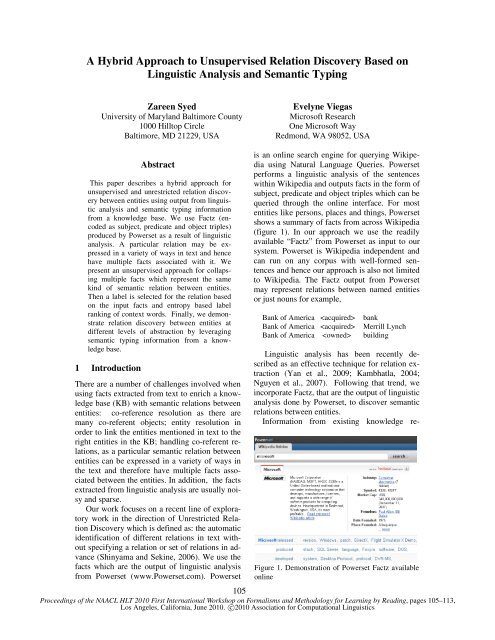W10-09
W10-09
W10-09
You also want an ePaper? Increase the reach of your titles
YUMPU automatically turns print PDFs into web optimized ePapers that Google loves.
A Hybrid Approach to Unsupervised Relation Discovery Based on<br />
Linguistic Analysis and Semantic Typing<br />
Zareen Syed Evelyne Viegas<br />
University of Maryland Baltimore County Microsoft Research<br />
1000 Hilltop Circle One Microsoft Way<br />
Baltimore, MD 21229, USA Redmond, WA 98052, USA<br />
Abstract<br />
This paper describes a hybrid approach for<br />
unsupervised and unrestricted relation discovery<br />
between entities using output from linguistic<br />
analysis and semantic typing information<br />
from a knowledge base. We use Factz (encoded<br />
as subject, predicate and object triples)<br />
produced by Powerset as a result of linguistic<br />
analysis. A particular relation may be expressed<br />
in a variety of ways in text and hence<br />
have multiple facts associated with it. We<br />
present an unsupervised approach for collapsing<br />
multiple facts which represent the same<br />
kind of semantic relation between entities.<br />
Then a label is selected for the relation based<br />
on the input facts and entropy based label<br />
ranking of context words. Finally, we demonstrate<br />
relation discovery between entities at<br />
different levels of abstraction by leveraging<br />
semantic typing information from a knowledge<br />
base.<br />
1 Introduction<br />
There are a number of challenges involved when<br />
using facts extracted from text to enrich a knowledge<br />
base (KB) with semantic relations between<br />
entities: co-reference resolution as there are<br />
many co-referent objects; entity resolution in<br />
order to link the entities mentioned in text to the<br />
right entities in the KB; handling co-referent relations,<br />
as a particular semantic relation between<br />
entities can be expressed in a variety of ways in<br />
the text and therefore have multiple facts associated<br />
between the entities. In addition, the facts<br />
extracted from linguistic analysis are usually noisy<br />
and sparse.<br />
Our work focuses on a recent line of exploratory<br />
work in the direction of Unrestricted Relation<br />
Discovery which is defined as: the automatic<br />
identification of different relations in text without<br />
specifying a relation or set of relations in advance<br />
(Shinyama and Sekine, 2006). We use the<br />
facts which are the output of linguistic analysis<br />
from Powerset (www.Powerset.com). Powerset<br />
is an online search engine for querying Wikipedia<br />
using Natural Language Queries. Powerset<br />
performs a linguistic analysis of the sentences<br />
within Wikipedia and outputs facts in the form of<br />
subject, predicate and object triples which can be<br />
queried through the online interface. For most<br />
entities like persons, places and things, Powerset<br />
shows a summary of facts from across Wikipedia<br />
(figure 1). In our approach we use the readily<br />
available “Factz” from Powerset as input to our<br />
system. Powerset is Wikipedia independent and<br />
can run on any corpus with well-formed sentences<br />
and hence our approach is also not limited<br />
to Wikipedia. The Factz output from Powerset<br />
may represent relations between named entities<br />
or just nouns for example,<br />
Bank of America bank<br />
Bank of America Merrill Lynch<br />
Bank of America building<br />
Linguistic analysis has been recently described<br />
as an effective technique for relation extraction<br />
(Yan et al., 20<strong>09</strong>; Kambhatla, 2004;<br />
Nguyen et al., 2007). Following that trend, we<br />
incorporate Factz, that are the output of linguistic<br />
analysis done by Powerset, to discover semantic<br />
relations between entities.<br />
Information from existing knowledge re-<br />
Figure 1. Demonstration of Powerset Factz available<br />
online<br />
105<br />
Proceedings of the NAACL HLT 2010 First International Workshop on Formalisms and Methodology for Learning by Reading, pages 105–113,<br />
Los Angeles, California, June 2010. c○2010 Association for Computational Linguistics


